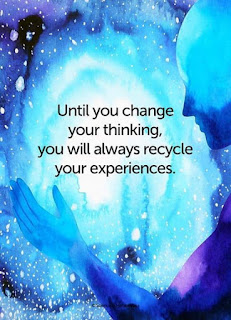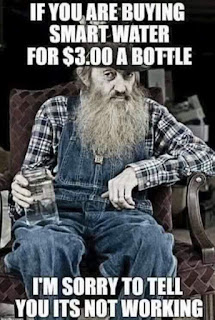The
Integrative Gradation Theory: (by Richard Michelle-Pentelbury)
“Adam?
What one word sums up your understanding of life?”
“Grades,”
the word came out. He wanted to explain,
‘but
not in actual years; it is about one’s individual insights, progressing through
the grade levels, in ‘the school of life,’ and about us all, all of us, being
simultaneously in the various lessons, our individual integration dependent on
our own handling of life’s curriculum. To wallow, or to grow.’
But
Thom, the older man asked: “As in ‘mental age’?
Different from our actual age?”
“Yes.
We have different degrees of innate intuition.”
“To
what purpose?”
“To
contribute to the health of the whole. To learn.”
“Will
we ever stop learning?”
Adam
laughed. “There will always be continuing education.”
“And
who is in Grade Two? And who in Grade Three, or Four?”
“All
of us. Simultaneously. In some things one may be in multiple grades, but in
some things, predominantly, living chiefly in a given grade. We ascend, depending
on our own perceptions, our own taking in of lessons. We grow, or wallow, given
individual understanding, by our insight on any given aspect of progress. It is
not for the lesson to teach All, but for us to learn All from the Lesson. Tadpole
to frog. Caterpillar to butterfly. At a sophisticated insight, we may become dimly
aware of something to yet learn, while processing yet another lesson, chiefly,
at a ‘grade three.’ One may even be in high school, while trapped in aspects of
a ‘grade one’ lesson. Kindergarten, or University; our ascending, our ‘aging,’
is not dependent on real-time.”
“This
is positive and negative? Grade-One being negative, compared to Grade-Thirteen?”
“Not
necessarily. A person chiefly in Grade Two is better asked to be the best that
he can be, within Grade Two. We progress toward the next grade, independent of
physical age. A given child may be wiser than an elder. Still, it could be
foolish, inadvisable, to ask either the Grade Two child, or Grade Two elder,
‘entirely’ to practice the more mature Grade Six, or to accommodate an
inappropriate aspect of more complex lessons, for most lessons are there for
all to see, or hear, almost all the time. We each do as we can within our own
understandings, our own awareness.”
“I
see. Do we all get ‘older’? Do we
all,
invariably,
progress up this graduated
ladder?”
“Yes,
and no. If by ‘we,’ you mean the individual, the ‘I, me, mine,’ then not
necessarily. If you mean by ‘we,’ the collective, the amalgamation of
like-mindedness, the gathering together of fragments in order to progress
toward the next junction, or level, then ‘yes,’ we collectively evolve, progress,
contribute, ascend, but each by each, contributing, yet not simultaneously.”
“Wonderful!
So, you’re saying we do not necessarily retain our ‘individual’ identity once
we’re dead, but fragment, spiritually, and regroup into some other evolving individual,
as it were.”
“Ha!
Constructs are but a theory, I am thinking. Some of us are personally sure. Some
say, ‘possibly, yes.’ Some say, ‘definitely no!’ Some identify, piecemeal. And
we may integrate not just once we’re dead. We can connect, spiritually, and
become collective even while alive. It all is One. But dead, some, I am
thinking, may maintain selfhood. Ghosts. Others may yield themselves up,
fragment, into the greater whole. Down here, alive, some are of one people, one
tribe. Others free themselves only to come together in yet another grouping,
made of many different tribes, but now dependent on the new collective. That is
why one is better off, I am now thinking, comfortably alone. Alone, yet
connected to all. Alone, yet intentionally learning. Alone, we are to find our
own truths.”
“I
see. Are truths, individual or collective, ‘wrong,’ or ‘right’?”
Adam
smiled, remembering an answer to that sort of question, so very long ago: “I am
thinking, truths as constructs are neither completely wrong, nor entirely right,
except in the minds of those whose thinking makes it so. We allow for all. We
integrate all. We accept all. Ha!”
“Hmm.
Evil too? We can ‘allow’ it? And besides, what of those lesser things than us?
Animals. Stones. Grass. Other material things. How do they fit into this theory?”
“It
all is in One!” Adam laughed. “But just like people, some are ‘denser’ than
others. Concentrated. Evil is intentionally destructive. Purposefully harmful.
Dullness thinks little of consequence. Some energy is slower. Less reactive.
Less responsive. But it all is One. Energy.
And it moves, feels, breathes. And we all know, somewhere down deep,
whether our part in it is healthy, or feeling ‘off,’ or ill, or selfish. Even a
bare room, or this home of yours, I am thinking, has a feeling, even when we
are gone from it. We give energy. Positive, a concept, can be suspect, fake.
And so too can Negative. Yet we all share energy. It all is One. We may choose
to be healthy, to contribute to the health of the whole, or we may choose to be
self-centered, to focus only on that which we want, which we understand, which
we hold dear. And most of us feel ourselves fitting somewhere in between it
all, aware, but not aware, depending on the circumstances, the lessons, the
impetus of our own lives. It all makes for One, in the end. Ha! Sorry, I’m
preaching.”
“In
the end? What end?”
Adam
reflected. “Change. We all recognize that the change of one thing to another brings
about an ‘end.’ So too will this universe perhaps collapse and fragment and
change into other things, eventually. Unrecognizable things. Even as the
caterpillar, I am thinking, never exactly suspects that it will become a
butterfly, but deep down, somewhere in its subconscious, its ‘other-knowingness,’
I surmise, it knows it is surely and steadily on a path of metamorphosis.
Change.”
“And
it is better to be a butterfly than a caterpillar?”
“Ha!
That too is a matter of perception. Tadpole, or frog? But most helpful to us
all is the common feeling that we reach for, that we think of, that we prepare
for:
something better. Ha! Even those
who think only of making ‘the now’ the very best that they can make it, day by
day, for all of us, make our tomorrows ‘better.’ Healthier.”
“And
you? What grade are you in?”
“Well,
certainly not at Graduation Day, ha! Then again, the same as anyone else: in every
grade, simultaneously. Parts of all. Yet wherever we are most comfortable, where
our awareness feels the most accord, there we are most to be found. Whatever is,
‘predominant.’ So too are the grade levels, or gatherings, or given societies, for
each of us, and all. Yet we are all One.”
“And
what would the advantage of our understanding be that we progress through Grades?”
“Compassion.
We could, I am thinking, allow the one mostly in Grade Seven to progress
predominantly within that grade, knowing he will eventually pass through it. We
may evaluate ourselves, our own reactions, our own grade, which, ideally, is
more about ‘integrating,’ being considerate, than is our having a negative
attitude, or judging. We too were once in Grade Two. So too might we take more
responsibility for some Grade-Two soul, so that he does not, as an older mentor
once said, ‘We do not just allow for the child to fall down the stairs!’ Ha!”
Thom
paused. “Hm. So, is there such a thing as predestination?”
“Hm?
Predestination pretends at certainties. One thinks one is important enough that
some Overlord, in the fact of the burgeoning billions of us, can take time out
to care for just one
special little
me? Ha! There is but choice! Response, and reaction. Grow, or wallow. Lessons. Grades.”
SEE:
http://www.bbc.com/future/story/20190617-deep-ethics-the-long-term-quest-to-decide-right-from-wrong?ocid=global_future_rss&ocid=global_bbccom_email_18062019_future





























